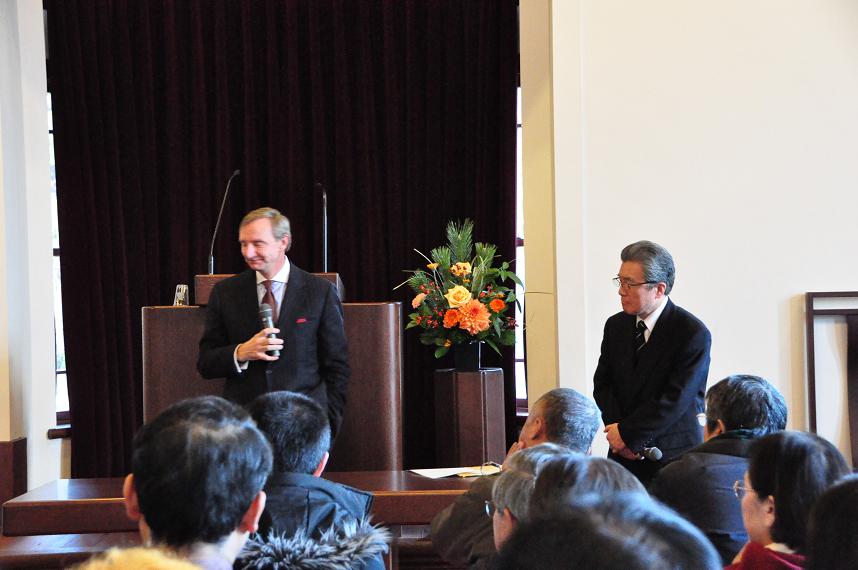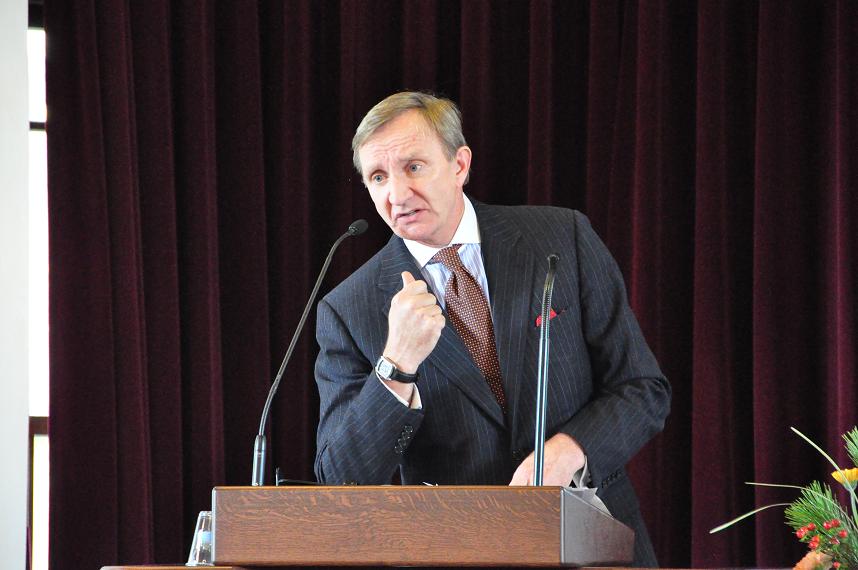Center for Interdisciplinary Study of Monotheistic Religions(CISMOR)Doshisha University
> Public Lectures > What’s Happening to American Evangelicals: Are there Big Changes Underway?Public Lectures
Public Lecture by Project 2
What’s Happening to American Evangelicals: Are there Big Changes Underway?
| Date: |
2010/01/16 13:00 − 15:00 |
|---|---|
| Place: | Clarke Memorial Hall Chapel, Imadegawa Campus, Doshisha University |
| Lecture: | Richard CIZIK, president of New Evangelical Partnership, fellow of Open Society Institute, senior fellow of United Nations Foundation, former vice president of National Association of Evangelicals (NAE) |
| Summary: | |
|
Mr. Richard Cizik began this lecture by saying that we are now witnessing a critical turning point in human history and that a major shift is required in our awareness as well as in the way we think and act. He further added that new evangelicals have new visions and strategies that distinguish them from the evangelicals of the generation of their parents and older. He mentioned his thoughts as follows. Mr. Cizik spoke about the three factors that are behind this “critical turning point.” The first factor is the historical change that is about to occur in the field of energy. Today, we are seeking a shift to renewable energy sources, such as solar power, wind, and geothermal heat. However, a drastic change of this magnitude inevitably causes friction in various parts of society and gives rise to an eschatological vision of the world, which has repeatedly occurred throughout history. For example, recently, a novel titled Left Behind is gaining massive popularity in the U.S. This book and others in the series have achieved tremendous success, selling 40 million copies in a cumulative total, while related books have sold 17 million copies. Reportedly, the royalties paid to the authors could amount to 100 million dollars annually. The book’s story begins with the sudden vanishing of one-third of the passengers on an airplane while it is crossing the Pacific. This may sound strange, but this phenomenon is called the “Rapture” by evangelicals, which refers to the time when those who have given their lives to Christ are suddenly taken by God to a safe place for salvation. This means that a Christian eschatological view is behind this novel. Against the backdrop of such a shift in energy policies and the elevation of the eschatological mood, older evangelists believe that Jesus will return someday to “rapture” them to another location; thus, they feel that they do not have to be responsible to this world. On the other hand, new evangelicals hold that even if they are destined for rapture, they are still responsible for the current situation of the Earth and must still take care of it, taking action to encourage a shift to renewable energy. The second factor is that the view of “science and religion” now requires change. In the view of old evangelicals, science is dangerous and cannot be trusted. On the other hand Richard Dawkins, for example, holds that one has to be an atheist to accept the theory of evolution. Simply put, there is a confrontation between those who completely deny science and those who completely deny religion. However, this does not mean that we have to choose either one of these extreme views. Francis Collins, a leader in human genome research who was appointed to the position of director of the National Institutes of Health by President Barack Obama, said to the effect that there is no conflict between religion and science; God’s domain is in the spiritual world and science’s domain is in the natural world, and these two worlds require each other. New evangelicals, as well, believe that science and religion are compatible. Therefore, they accept data of climate change and call for action to cope with the problem. The third factor is the difference in the attitude toward nuclear weapons between new and old evangelicals. Conventionally, American evangelicals were active at the forefront of the Cold War against the former Soviet Union. For example, President Ronald Reagan first used the phrase “evil empire” to refer to the Soviet Union in his speech to an association of evangelicals in 1983. Old evangelicals are still bound by the view and understanding of the world that prevailed during that Cold War period and remain hesitant to take action toward nuclear abolition even though we have fewer reasons to continue to possess nuclear weapons after the collapse of the Soviet Union. In fact, the lecturer said, when he began to discuss the nuclear problem, he was met with a rebuttal from an old evangelical leader who said that for him, the issue of abortion was more important. However, in the face of serious threats, such as the energy problem, climate change, and the possibility of terrorist attacks using nuclear weapons, the world must undergo drastic changes, which inevitably require new visions and strategies. New evangelicals uphold the concept of the “common good” at the core of their vision. In their view, the “common good” basically refers to that which is good for all people, both spiritually and physically. Therefore, they believe that natural resources are common properties of all of humanity. Old evangelicals take action in a manner that “conflicts” with something, while new evangelicals take action in a manner that “cooperates” with others. In concluding his lecture, Mr. Cizik pointed to the fact that at no other time in history have people of different countries been sharing so many interests among themselves, and emphasized the significance and possibilities of new evangelicals who place special importance on the “common good” and “cooperation.” Ryuji Fujimoto (Research Fellow, CISMOR, Doshisha University) |
|
|
*This lecture is given in English, with Japanese consecutive interpretation. *Admission Free, No reservation necessary *Inquiry: 075-251-3972 (CISMOR) |
|
|
Program(Japanese) |
|

